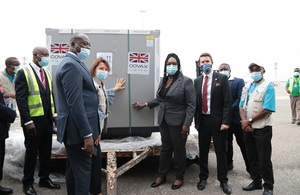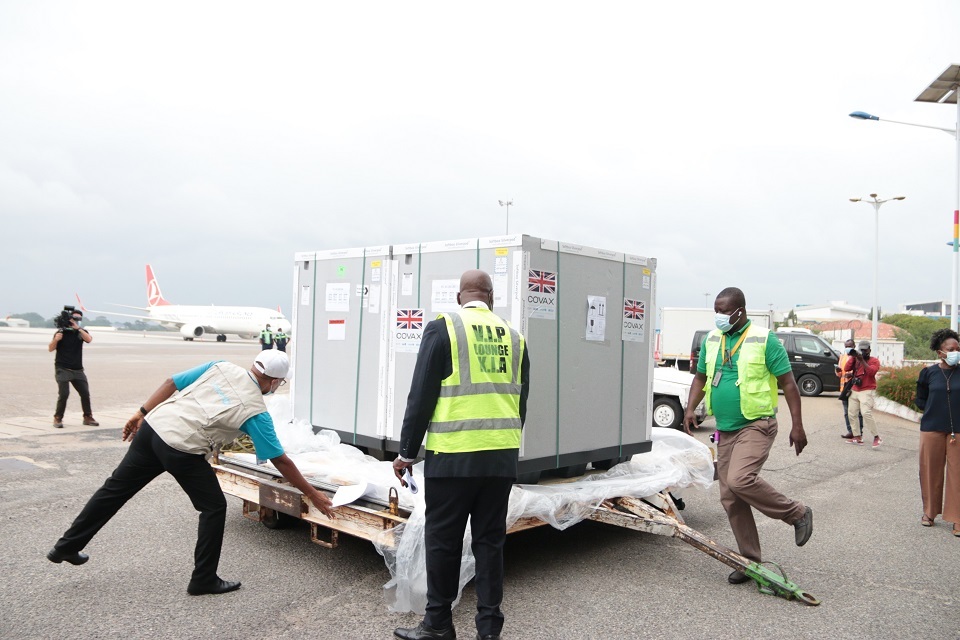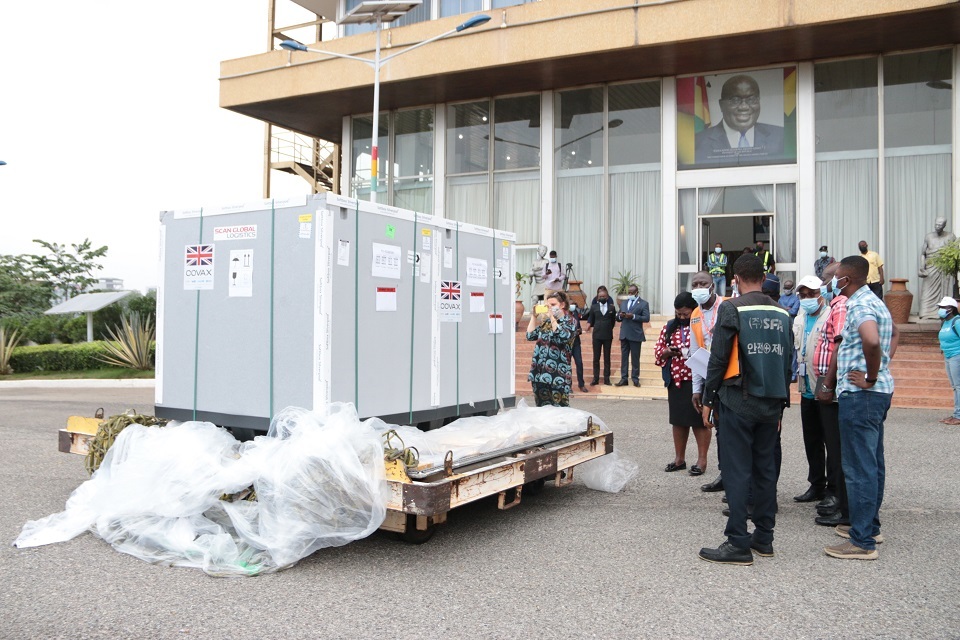Almost a quarter of a million UK-donated COVID-19 vaccines arrive in Ghana
A shipment of 249,000 UK-donated AstraZeneca COVID-19 vaccines has today (Wednesday, 18 August) arrived in Accra’s Kotoka International Airport.

The vaccines were met at Kotoka International Airport by senior officials from the British High Commission to Ghana, including Chargé d’affaires, Dr Joseph Whittle and the UK Health Adviser to Ghana, Uzoamaka Gilpin. Honourable Deputy Minister Tina Mensah and representatives from Ghana’s Ministry of Health also attended the arrival alongside UNICEF Representative in Ghana, Anne-Claire Dufay.
Today’s shipment is part of a broader pledge made by the UK Prime Minister Boris Johnson, at the G7 meeting in June. The UK will share 100 million jabs with the rest of the world, of which 80% will be through COVAX. The UK has already donated around 5 million vaccine doses to COVAX and 3 million of these doses will be sent to countries across Africa. Nigeria, The Democratic Republic of the Congo (DRC) and Ethiopia are among the countries to already receive vaccines.

Speaking at Kotoka International Airport, the Chargé d’affaires for the British High Commission to Ghana Dr Joseph Whittle, said:
Today’s shipment signals another step forward in Ghana’s vaccine programme. It means 249,600 front-line health workers, vulnerable people most at risk from COVID-19 and those in need of their vital second jab have access to vaccinations and better protection against COVID-19 variants.
Our shared commitment to overcome COVID-19 has only strengthened the UK-Ghana partnership, and this is reflected by the fact that Ghana is one of the first countries in the world receiving UK-donated vaccines.
The UK has been at the forefront of the global response to COVID-19, including through investing £90 million to support the development of the Oxford-AstraZeneca vaccine. More than half a billion doses of the Oxford-AstraZeneca vaccine have been delivered at a non-profit price globally, with two-thirds going to lower and middle-income countries.
The UK kick-started efforts to establish COVAX in 2020, providing a total of £548 million to fund vaccines for lower income countries. The scheme has delivered more than 152 million vaccine doses to over 137 countries and territories, including in 83 lower-middle income countries. 65% of the initial vaccine doses have been Oxford-AstraZeneca. COVAX aims to deliver 1.8 billion vaccines to lower-income countries around the world by early 2022.
UK Foreign Secretary Dominic Raab, said:
Three million doses of UK-donated vaccines are now arriving in 11 countries across Africa, including Ethiopia, Kenya and Uganda, to help the fight against COVID-19.
This is the first batch of 80 million being donated via COVAX – because we know no one is safe until everyone is safe.
The UK continues to support Ghana’s COVID-19 response: putting UK experts at the heart of Ghana’s Health Service and the Ministry of health, supporting the Ministry of Health to expand quality COVID-19 treatment and testing in 40 underserved districts whilst ensuring continuation of essential health services for women and children.

Further information
- the following footage is available at this WeTransfer link – Wockhart facility in the UK: Vaccine vial production for AstraZeneca. AstraZeneca vaccines stored in refrigerated warehouse operated by Movianto in the UK
- the 9 million Oxford-AstraZeneca doses being donated are not needed for the domestic rollout. The doses will be UK-branded
- 5 million vaccines are being offered to COVAX, the global scheme to get COVID-19 vaccines to developing countries, to be delivered to the most vulnerable countries. Further details will be announced in due course
- the vaccine doses being donated on a bilateral basis are being transported by Crown Agents
- the UK provided £90 million to support the Oxford-AstraZeneca vaccine: £25m on the initial research & development and £65m to scale up manufacturing
- these vaccines were developed by the University of Oxford, made by Oxford Biomedica in Oxford and packaged in North Wales
- the UK made it clear as part of that funding that the vaccine should be affordable around the world and consequently, AstraZeneca agreed to distribute it at a non-profit price during the pandemic
- the cost of this donation has been funded through UK Overseas Development Assistance and will come over and above the ODA spending target of 0.5% of GNI if needed
- Gavi, the Vaccine Alliance is a public-private partnership that helps vaccinate half the world’s children against some of the world’s deadliest diseases. Since its inception in 2000, Gavi has helped to immunise a whole generation – over 822 million children – and prevented more than 14 million deaths, helping to halve child mortality in 73 lower-income countries. Gavi also plays a key role in improving global health security by supporting health systems as well as funding global stockpiles for Ebola, cholera, meningitis and yellow fever vaccines. After two decades of progress, Gavi is now focused on protecting the next generation and reaching the unvaccinated children still being left behind, employing innovative finance and the latest technology – from drones to biometrics – to save millions more lives, prevent outbreaks before they can spread and help countries on the road to self-sufficiency. Learn more at www.gavi.org and connect with us on Facebook and Twitter
- the Vaccine Alliance brings together developing country and donor governments, the World Health Organization, UNICEF, the World Bank, the vaccine industry, technical agencies, civil society, the Bill & Melinda Gates Foundation and other private sector partners. View the full list of donor governments and other leading organizations that fund Gavi’s work here
- COVAX, the vaccines pillar of the Access to COVID-19 Tools (ACT) Accelerator, is co-led by CEPI, Gavi and WHO – working in partnership with developed and developing country vaccine manufacturers, UNICEF, the World Bank, and others. It is the only global initiative that is working with governments and manufacturers to ensure COVID-19 vaccines are available worldwide to both high-income and lower-income countries.